[小初高学习]XX年八年级下册英语Module 3 unit2导学习型教学案(外研版)
新外研版八年级下册英语 Module 3 Unit 2 教案(教学设计)
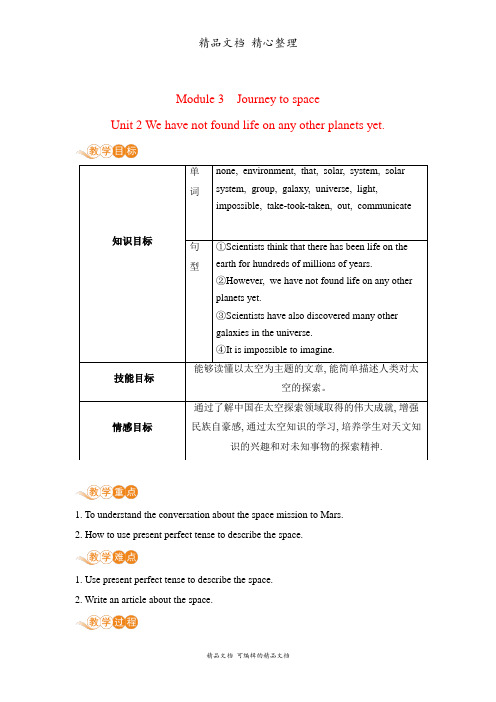
Module 3 Journey to spaceUnit 2 We have not found life on any other planets yet.1. To understand the conversation about the space mission to Mars.2. How to use present perfect tense to describe the space.1. Use present perfect tense to describe the space.2. Write an article about the space.(Act. 2) questions:①Has there been life onthe earth for hundreds ofmillions of years?②Have we found life onany other planets yet?2. Read Paragraph 2 andfill in the blanks afterreading it.The Earth is a planet and it(1)__________________the sun. Seven(2)__________________also go aroundthe sun. (3)_________them has anenvironment like the earth.So scientists haven’t(4)_________ life on them.The sun and its planets(5)__________________the solar systemand our solar system iscalled the (6)_________ orthe Milky Way. There are(7)__________________stars in theGalaxy and our sun is onlyone of them.3. Paragraphs 3 and 4:Let students tell true orfalse after reading them:①The light from the stars the questions:Keys:①Yes, there has been.②No, we haven’t.2. Read Paragraph 2and fill in the blanksafter reading it.Keys:(1)goes around(2)other planets(3)None of(4)found(5)are called(6)Galaxy(7)billionsof3. Read Paragraph 3and Paragraph 4 andtell true or false.Keys:①T ②F③F4. Read Paragraph 5and answer thequestions.有助于学生更加准确地获取信息, 提高阅读效果和技能。
英语:Module3 Unit2教案(外研社八年级下)

Part II :Task 1 : Learn the new words.Task 2: Talk about the picturePart III: Scanning and Skimming Task: Read thepassage andanswer thequestions inActivity 2.Preparation Step one:Step two:Step three:Task: Read the passage and decide where you’re likely toHere’s where I work on Starsearch.We decide what to listen to… and who to see.I hatelosing.Directions: Label the pictures with the words.(1). Read through the words on the screen. Have the Ss.Repeat them after you.(2).Read the words separately and have them rememberthem.(3).Make some sentences with the words.(4) Call back the answers from the whole class.Directions:(1). Let the Ss look at the picture and discuss it with apartner.(2). Call back the answers from the whole class.Directions:The teacher ask the Ss to read the passage.Ss read the passage and answer the questions individually.Call back the answers from the whole class.Repeat them afterthe teacher..Make somesentences with thewordsdiscuss it with apartner.read the passageSs read the passageand answer thequestionsindividually.read the passage Step one:Step two:Task: Answer the questions about words and expressions in the box in Activity 4. Step one:Step two:Part IV : Dealing with expressions:First make sure the Ss understand what they should do. Ssread the passage and do activity 3 on page 21 individually andcheck with a partner.Call back the answers from the whole class, havingindividuals read out the answers.Read through the sentences and make sure the Ssunderstand what they mean. Ss do activity 4 on page 21individually and check with a partner.Call back the answers from the whole class.1. And you want a job in radio? (Unit2, P20)陈述句用升调读就变成了问句,这种问句称为陈述问句,如:The train is in already?2. Shouldn’t you be at school? (Unit2, P20)这是一个否定问句,带有惊讶情绪,这种问句还可以表示责Ss read the passageand do activity 3on page 21individually andcheck with apartner.Ss do activity 4 onpage 21individually andcheck with apartner.Listen carefully难和赞赏, 如:--Why are you driving so fast? Don’t you know the traffic regulations?--Aren’t these flowers beautiful?3. When I was about four or five years old, I remember sitting close to the radio in the living room, listening to my favourite programmes, and to the voices of my favourite presenters. (Unit2, P20) 在我四五岁的时候,我记得自己坐在客厅里的收音机旁, 听我喜欢的节目和喜欢的播音员的声音.⑴remember doing sth. “记得做过某事”;remember to do sth. “记着去做某事” , 如:I remember seeing her once.我记得曾见过她一次。
八年级下Module3Unit 2导学案
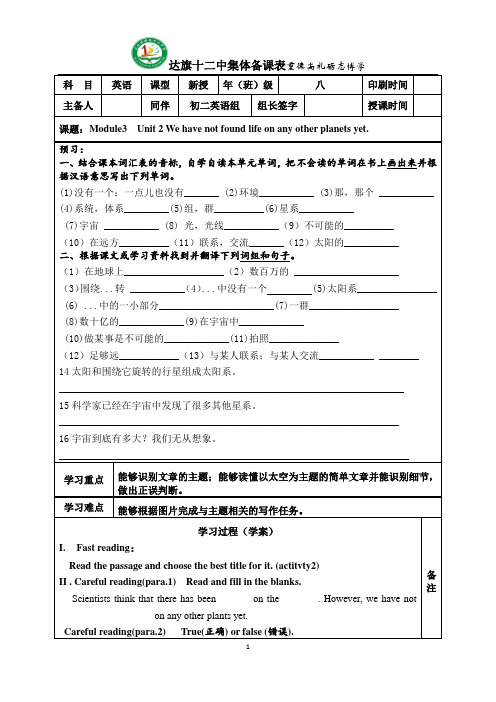
— No, I have _______ read a word about it.
3. — Have you ______ been to the Great Wall in China, Vicky?
— Of course, I have.
V. Writing: Write a passage to describe the picture in Activity5.
VI.能力提升:1.用already, yet, just, ever或never完成下列句子。
1. I have ______ done the heavy work and now I feel very tired.
课后反思:
备注
安全提示:上下楼梯要靠右行,不在楼道内大声喧哗。
14太阳和围绕它旋转的行星组成太阳系。
_____________________________________________________________________
15科学家已经在宇宙中发现了很多其他星系。
____________________________________________________________________
Careful reading(para.3&4) Read para.3&4 and answer questions.
1.What have scientists discovered in the universe?
__________________________________
2. Have scientists sent spaceships to Mars?
外研版英语八下Module3《Journeytospace》(Unit2)教学设计
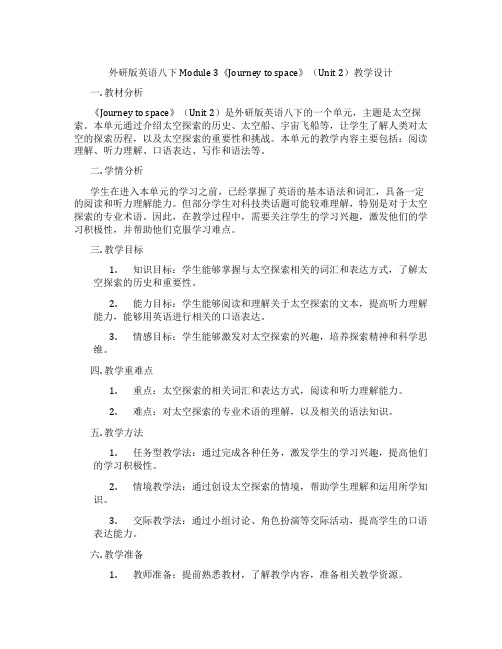
外研版英语八下Module 3《Journey to space》(Unit 2)教学设计一. 教材分析《Journey to space》(Unit 2)是外研版英语八下的一个单元,主题是太空探索。
本单元通过介绍太空探索的历史、太空船、宇宙飞船等,让学生了解人类对太空的探索历程,以及太空探索的重要性和挑战。
本单元的教学内容主要包括:阅读理解、听力理解、口语表达、写作和语法等。
二. 学情分析学生在进入本单元的学习之前,已经掌握了英语的基本语法和词汇,具备一定的阅读和听力理解能力。
但部分学生对科技类话题可能较难理解,特别是对于太空探索的专业术语。
因此,在教学过程中,需要关注学生的学习兴趣,激发他们的学习积极性,并帮助他们克服学习难点。
三. 教学目标1.知识目标:学生能够掌握与太空探索相关的词汇和表达方式,了解太空探索的历史和重要性。
2.能力目标:学生能够阅读和理解关于太空探索的文本,提高听力理解能力,能够用英语进行相关的口语表达。
3.情感目标:学生能够激发对太空探索的兴趣,培养探索精神和科学思维。
四. 教学重难点1.重点:太空探索的相关词汇和表达方式,阅读和听力理解能力。
2.难点:对太空探索的专业术语的理解,以及相关的语法知识。
五. 教学方法1.任务型教学法:通过完成各种任务,激发学生的学习兴趣,提高他们的学习积极性。
2.情境教学法:通过创设太空探索的情境,帮助学生理解和运用所学知识。
3.交际教学法:通过小组讨论、角色扮演等交际活动,提高学生的口语表达能力。
六. 教学准备1.教师准备:提前熟悉教材,了解教学内容,准备相关教学资源。
2.学生准备:预习教材,了解太空探索的基本知识。
七. 教学过程1.导入(5分钟)教师通过展示太空探索的图片或视频,引导学生谈论太空探索的话题,激发学生的学习兴趣。
2.呈现(10分钟)教师通过展示教材中的阅读文本,让学生初步了解太空探索的历史和重要性。
同时,教师引导学生关注文章中的关键词汇和表达方式。
XX年八年级下册英语Module3unit2导学案(外研版)
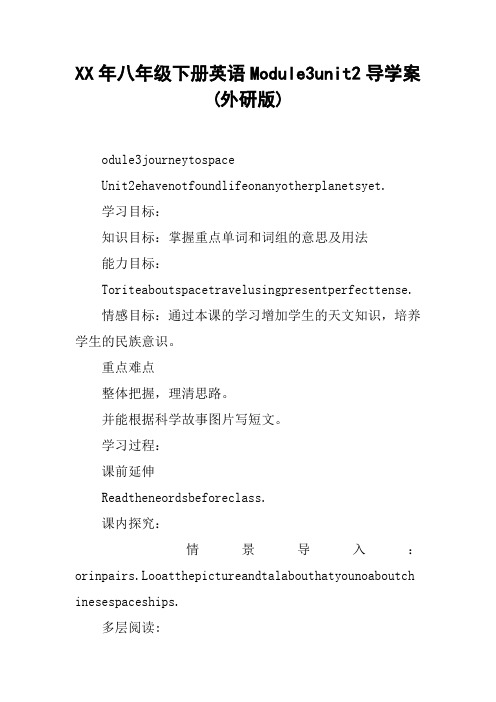
XX年八年级下册英语Module3unit2导学案(外研版)odule3journeytospaceUnit2ehavenotfoundlifeonanyotherplanetsyet.学习目标:知识目标:掌握重点单词和词组的意思及用法能力目标:Toriteaboutspacetravelusingpresentperfecttense.情感目标:通过本课的学习增加学生的天文知识,培养学生的民族意识。
重点难点整体把握,理清思路。
并能根据科学故事图片写短文。
学习过程:课前延伸Readtheneordsbeforeclass.课内探究:情景导入:orinpairs.Looatthepictureandtalabouthatyounoaboutch inesespaceships.多层阅读:I.Fastreading.Readthepassageandchoosethebesttitlefo rit.Anyoneoutthere?2.LifeonearthThesunandthestars4.ThestarsatnightII.carefulreading.Readagain,checthetruesentences.Theearthisastar.Thesunisastar.Thereisorethanonegalaxyintheuniverse.Thelightfrothestarsinothergalaxieshastravelledforal ongtietoreachus.Scientistshavereceivedanyessagesfrospace.Spaceshipshavevisitedostoftheuniverse.III.pletethepassageiththeordsandexpressioninthebox.unicatedoubtenvironentnonesolarsysteuniverseIstherelifeonotherplanets?Thereareeightplanetsinour ____________,but___________ofthehasa____________lie thatoftheearth.Spaceshipsfrotheearthhavedonesurveysofotherplanets,buttheyhavenotfoundanylifethere.hyha snoonefrootherplanetstriedto___________ithus?Itistr uethatscientistshavenotdiscoveredlifeonotherplanets inthe____________yet,butsoescientistsdonot_________ _thattheycanfinditsoeday.精讲点拨:ScientiststhinthattherehasbeenlifeontheEarthforhund redsofillionsofyears.科学家认为地球上的生命已经有亿万年了。
外研版八年级下册英语教案设计Module3 Unit2
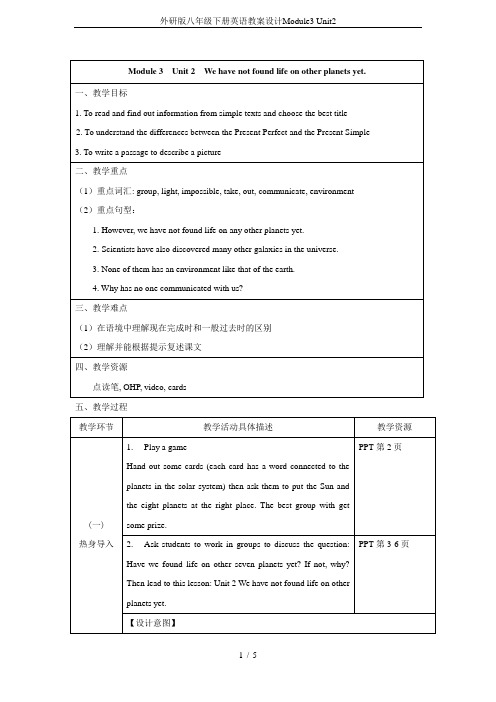
二、教学重点
(1)重点词汇: group, light, impossible, take, out, communicate, environment
(2)重点句型:
1. However, we have not found life on any other planets yet.
PPT第11-12页
3.Detailed reading
Read Para.1 and answer:
1). How long has there been life on the earth?
2). Have we found life on any other planets yet?
Read Para.2 and answer:
分段进行细节阅读,有利于学生对文章的透彻理解,在解决问题的同时,解决了语言点上的困惑,在具体语境中也更好地理解现在完成时和一般过去时的用法区别。设计这些问题是为了帮助学生提高学习的主动性,学会自主学习的方法,逐渐形成比较完善的阅读学习策略,以抢答积分的形式可以提高学生的上进心和竞争意识。
4.Post-reading(Activity 4)
(四)
拓展运用
1.Show students a cartoon picture, letSsanswer the questions in Activity 5 first, and then use the answers to describe the picture orally.
PPT第16-18页
Module3 Unit 2We have not found life on other planets yet.
外研版八年级英语下册Module 3Unit 2 教学导案含答案

Module3 Period 2 Reading and writingTarget language目标语言1. Word &phrasesplanet, alone, also, part, light, beyond,2. Key sentences重点句子…just (already) have/ has +p.p ……haven't/ hasn't + p.p…yet.Have/ Has + …+p.p +…yet?Ability goals能力目标Enable students to read and write a story about space travel.Learning ability goals学能目标Help students learn how to read and write a story about space travel.Teaching important/difficult points教学重难点How to read and write a story about space travel.Teaching aids教具准备Some pictures or a projector.Teaching procedures and ways教学过程与方式Step I Revision and lead-inCheck the homework. Talk about space travel.T: Looking up the sky, we can see the sun, the moon and stars in the sky. But what is the sky like? We didn’t k now until we have traveled in space. With the development of science, our dream of space travel has come true.T: Please look at the picture on page 20. What can you see?S: A spacecraft.T: Yes, we have sent some spacecraft into universe. What is in the universe?Help to answer and write down some important words.S: The sun, the earth, the moon, and some stars.S: And 9 planets. They are called the solar system.S: Galaxy.…T: Well done. We have known so many words about the space. Please write them down.Show the following.galaxy, planet, solar system, star, universeT: Can you put these words and expressions in order: from small to large?Check the answers and ask students to read the words.StepⅡReadingT: Boys and girls. We’ll read a passage about the life on other planets. First please look at Part 2. There are four titles. (Go through with students) Please read the passage and choose the best title.Then ask students to read the passage again and check the true statements in part 4.Check the answers. After that, ask students to work in groups and discuss the questions in part 5. Sample answers to part 5:1. Living things needs air.2. Most often.3. Some stores.4. About 3 inches.5. A spacecraft.6. About 2 hours by plane.Step ⅢWriting (4: P21)T: Have we found any life on other planets? Please look at the cartoon picture. What happened? Ask students to work in pairs and ask and answer the questions.Then ask them to to write a story "Life on Mars" according to the answers in part 6.Sample version:We've just had some news about the mission to explore Mars. Scientists have just heard a message from a spacecraft. It has landed Mars. And it has discovered people there. But they haven't sent us a message because they can't hear us. They prefer life on Mars, so they haven't visited us on Earth. They also made TVs, radios, cars and so on with the other spacecraft. I think they are having a good time.StepⅤHomeworkAsk students to try to find more information about space.Unit2 We haven’t found life on other planets yet.课型:读写课1. 阅读文章,能了解文章大意;2.了解天体中各类星球的排列顺序;3.会用本单元的新词汇4.能根据关键词或者图例复述课文,并发表自己的看法。
Module3Unit2、Unit3教案详解-外研版八年级下册英语

(四)学生小组讨论(用时10分钟)
1.讨论主题:学生将围绕“一般过去时态在描述旅行中的应用”这一主题展开讨论。他们将被鼓励提出自己的观点和想法,并与其他小组成员进行交流。
2.引导与启发:在讨论过程中,我将提出一些引导性问题,帮助学生更好地运用一般过去时态,并解决在描述旅行时可能遇到的问题。
-词汇的准确运用:学生在选择和使用词汇时,可能会出现语义上的错误,如混淆"adventure"和"journey",或者在使用"on the edge of"等短语时搭配不当。
-写作中的逻辑连贯性:在编写冒险旅行的短文时,学生可能难以做到内容的逻辑连贯和条理清晰,需要教师指导如何组织文章结构,使用过渡性词汇和短语。
3.重点难点解析:在讲授过程中,我会特别强调一般过去时态的动词变化规则和时间状语从句的使用。对于难点部分,我会通过例句和对比来帮助大家理解。
(三)实践活动(用时10分钟)
1.分组讨论:学生们将分成若干小组,每组讨论一个与旅行或冒险相关的实际问题,如准备旅行时需要注意的事项。
2.实验操作:为了加深对一般过去时态的理解,我们将进行一个角色扮演活动,模拟一次冒险旅行的对话。
2.增强文化意识:通过探讨旅行和冒险话题,引导学生了解不同文化背景下的冒险故事,拓宽国际视野,培养跨文化交际意识。
3.培养思维品质:通过阅读理解和写作练习,提高学生分析、推理和评价能力,激发创新思维,形成独立见解。
4.提升学习能力:鼓励学生在课堂活动中积极探究,合作交流,培养自主学习策略,提高学习效率。
5.培养情感态度:通过学习冒险话题,引导学生树立勇敢面对挑战的精神,培养积极向上的情感态度。
- 1、下载文档前请自行甄别文档内容的完整性,平台不提供额外的编辑、内容补充、找答案等附加服务。
- 2、"仅部分预览"的文档,不可在线预览部分如存在完整性等问题,可反馈申请退款(可完整预览的文档不适用该条件!)。
- 3、如文档侵犯您的权益,请联系客服反馈,我们会尽快为您处理(人工客服工作时间:9:00-18:30)。
XX年八年级下册英语Module 3 unit2
导学案(外研版)
本资料为woRD文档,请点击下载地址下载全文下载地址module3journeytospace
Unit2wehavenotfoundlifeonanyotherplanetsyet.
学习目标:
.知识目标:掌握重点单词和词组的意思及用法
2.能力目标:
Towriteaboutspacetravelusingpresentperfecttense.
3.情感目标:通过本课的学习增加学生的天文知识,培养学生的民族意识。
重点难点
整体把握,理清思路。
并能根据科学故事图片写短文。
学习过程:
课前延伸
Readthenewwordsbeforeclass.
课内探究:
(一)、情景导入:workinpairs.Lookatthepictureandtalkaboutwhatyouknow aboutchinesespaceships.
(二)多层阅读:
I.Fastreading.Readthepassageandchoosethebesttitlefo rit.(√)
1.Anyoneoutthere?
2.Lifeonearth
3.Thesunandthestars
4.Thestarsatnight
II.carefulreading.Readagain,check(√)thetruesentences.
Theearthisastar.
Thesunisastar.
Thereismorethanonegalaxyintheuniverse.
Thelightfromthestarsinothergalaxieshastravelledfora longtimetoreachus.
Scientistshavereceivedmanymessagesfromspace.
Spaceshipshavevisitedmostoftheuniverse.
pletethepassagewiththewordsandexpressioninth
ebox.
communicate
doubt
environment
none
solarsystem
universe
Istherelifeonotherplanets?Thereareeightplanetsinour ____________,but___________ofthemhasa____________li kethatoftheearth.Spaceshipsfromtheearthhavedonesurv eysofotherplanets,buttheyhavenotfoundanylifethere.w hyhasnoonefromotherplanetstriedto___________withus? Itistruethatscientistshavenotdiscoveredlifeonotherp lanetsinthe____________yet,butsomescientistsdonot__ ________thattheycanfinditsomeday.
、精讲点拨:
.Scientiststhinkthattherehasbeenlife
ontheEarthforhundredsofmillionsof
years.科学家认为地球上的生命已经有亿万年了。
millionsof数百万
hundredsof数百
thousandsof成千上万
billionsof数十亿
e.g.Therearebillionsofstarsinthe
Galaxy,andoursunisonlyoneofthem.
银河系中有数十亿颗恒星,我们的太
阳只是其中的一个。
2.Noneofthemhasanenvironmentlike
thatoftheearth,soscientistsdonot
thinktheywillfindlifeonthem.他们中没有一个有像地球这样的环境,因
此科学家们认为在他们上面找不到生命。
w
noneof…表示(三个以上)一个也没有。
做主语时,谓语动词可用单数或复
数。
e.g.Noneofushas/havebeentothemars.
我们中没一个去过火星。
Theyareveryfarawayandtheirlighthastotravelformanyye arstoreachus.
它们离我们很遥远,它们的光必须要经过很多年才能到达地球。
reach
为__________动词,后接宾语。
arrive
为__________动词,后接介词____________构成动词短语。
介词_________后接大地方,介词_________后接小地方。
若后跟地点副词here,there,home等,介词省略。
get
为__________动词,和介词_________连用后才可接宾语。
若后跟地点副词here,there,home等,介词省略。
4.Sohowlargeistheuniverse?It’s
impossibletoimagine.
所以宇宙有多大?我们无从想象。
句型:Itis+形容词+to+动词原形,意思是“做某事很……”
e.g.Itisdifficulttoreadthesewords.
读这些单词很难。
5.withsomanystarsintheuniverse,are
wealone,oristherelifeouttherein
space?
宇宙中有这么多星球,我们是孤独的
吗?或者太空中还有其他生命存在呢?
with+名词+介词短语,表示伴随情况,意思是“带着……”。
e.g.mr.Zhangiscomingwithabookin
hishands.
张老师手里带着一书进来了
(四):Test:
单项选择:
.
She_________theteacher’soffice.youcanfindherthere.
A.hasbeento
B.hasgoneto
c.hasleft
D.went
2.I______tocanadaIt’ssobeautiful.
A.won’tgo
B.havegone
c.don’tgo
D.have
been
3.--HasDavecome_______?
–-yes,shehas_______beenherefor10minutes.
A.yet,already
B.already,yet
c.already,already
D.yet,yet
4.______yourhelp,Ifinishedtheworkeasily.
A.with
B.without
c.Under
D.Below
5.It’simpossible_______howlargeistheGalaxy.
A.imagine
B.toimagine
c.imagining
D.imagined
我是小小翻译家:
.地球是一颗行星,它围绕着太阳转动。
TheEarthisaplanetandit__________
_________theSun.
2.我们还没有在其它行星上发现生命。
wehavenotfoundlife_______
______
_______planets________.
3.科学家们已经在宇宙中发现了许多其他星系。
Scientistshavediscoveredmanyothergalaxies_________ ________
_________.
4.太阳系只是我们星系的一小部分。
Thesolarsystemis________
_________
________
________
ourGalaxy.
5.宇宙中有这么多的恒星,我们是孤独的吗?太空中还有其他生命吗?
________somanystars______theuniverse,______________ _
_________,or
_______
_______lifeoutthere____
______?
三、课后拓展:
.Readandwritethephrases.
2.PreviewUnit
3.。
